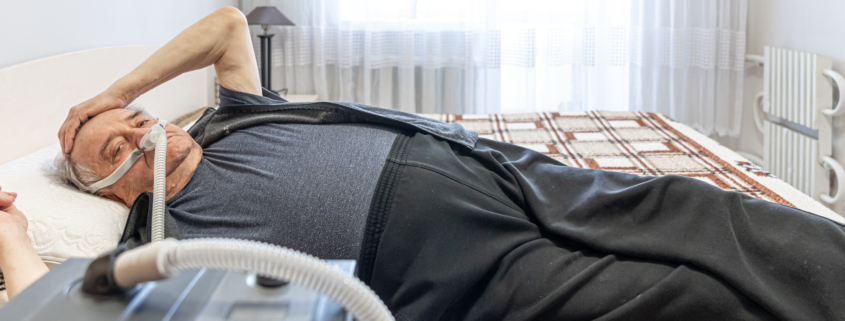What You Need to Know About Your CPAP and Cancer
Users of recalled Philips devices used to treat sleep apnea may have been exposed to toxic chemicals and carcinogens. As a result, the company has issued a recall for several products. The recall includes bilevel positive airway pressure (BiPAP), adaptive-servo ventilation (ASV), and continuous positive airway pressure (CPAP) sleep apnea devices. Disintegrating polyurethane foam (PE-PUR), used to soften both sound and vibrations given off by these products, was discovered inside the air pathway of the device and is potentially linked to an increased risk of developing certain cancers.
The company has advised those who depend on the recalled devices to discontinue use immediately and find an alternative option. They are currently in the process of either repairing or replacing the affected devices. Users of Philips CPAP, BiPAP, or ASV machines that utilize them as life-saving devices might continue using their devices if their healthcare provider determines that the benefits outweigh any potential risks. If you or a loved one has suffered from lung problems or other injuries or has been diagnosed with cancer after using a recalled Philips device, you could be entitled to compensation.
Sleep Apnea Basics
While many cases of sleep apnea go undiagnosed, approximately 22 million Americans knowingly suffer from the disorder. According to the American Sleep Apnea Association, there are three primary types of sleep apnea. Obstructive sleep apnea is the most common and occurs when your throat muscles are relaxed. Central sleep apnea happens when your brain fails to send the appropriate signals to the muscles that control your breathing. When someone suffers from central and obstructive sleep apnea, it is known as treatment-emergent or complex sleep apnea.
Here are some of the most common symptoms to look out for if you think you may be suffering from sleep apnea:
- Daytime fatigue
- Low energy throughout the day
- Waking up with a sore throat
- Experiencing dry mouth in the morning
- Irritability
- Insomnia
Because lifestyle modifications like losing weight or quitting smoking do not always work for everyone, considering therapies like CPAP devices may be a patient’s only option. In severe cases, nasal or sinus surgeries may solve the problem. Sleep apnea restricts a person’s body from receiving an ample amount of oxygen at night which can lead to life-threatening diseases like diabetes, heart disease, or cancer. If you are suffering from sleep apnea, you should seek the advice of a medical professional as soon as possible.
Why is Exposure to Polyurethane Foam Dangerous?
The development of malignant diseases, including cancer, may arise from inhaling the urethane in polyurethane foam because it is a possible carcinogen. While intact, PE-PUR foam is harmless; when broken down by high heat, humidity, or unapproved cleaning practices, it emits hazardous chemicals.
Here are some harmful chemicals emitted by recalled Philips devices when the foam decomposes:
Formaldehyde — can cause nasal cancer if inhaled regularly.
PFOS — fluorinated chemicals belonging to the PFAs category can lead to several different types of cancer, including liver, kidney, bladder, and pancreatic
Dichloromethane — also known as methylene chloride, can cause non-Hodgkin lymphoma, multiple myeloma, liver cancer, and lung cancer.
Benzene — a chemical that damages a cell’s DNA, can cause several types of cancer, including breast and lymphatic cancer.
Solvents — may lead to stomach, bladder, lung, or hematopoietic cancer.
Volatile organic compounds (VOCs — have been linked to various types of nasal cancer).
Flame retardant — has been linked to learning disabilities, thyroid and liver cancer.
If you were exposed to PE-PUR from a Philips recalled device, you may experience irritation of the nose or throat, inflammation in your respiratory tract, nausea, dizziness, or passing out. Heavy exposure may damage the kidneys, liver or affect your bone marrow over time.
Some potential diseases PE-PUR foam may have exposed users of Philips recalled machines to include:
- Breast cancer
- Brain cancer
- Non-Hodgkin lymphoma
- Nasal cancer
- Leukemia
- Stomach cancer
- Liver cancer
- Bladder cancer
We encourage you to contact our team of exceptional defective medical device attorneys to determine if you are eligible to file a claim for a defective Philips device. If you used your device for at least six months, have developed a disease directly linked to PE-PUR foam, and file your claim within the statute of limitations, you may be eligible to seek compensation for your injuries. Our initial consultation is always free, and we are ready to carefully assess your situation and determine whether you qualify to seek compensation for a concerning diagnosis.
What Should I Do If My Device Was Recalled?
Visit Philips’s website to determine if you are using a recalled device; you can do so by looking up your device’s serial number. Upon determining that your device is affected, you may begin a claim on the company’s website. You should stop using any recalled Bilevel PAP, CPAP, or ASV right away. Schedule a visit with your primary healthcare provider to determine if you have suffered any adverse effects after using a recalled Philips device.
If you cannot wait for a new device, you should still talk to your doctor to determine if continuing use of the device benefits you more than puts you at risk. Your doctor will provide you with alternative treatment options and advice on the next steps you should take to safeguard your health. Our CPAP cancer lawyers have the right experience to assist you in filing a defective medical device claim. The time you have to file is limited, which is why you should not hesitate to reach out to one of our knowledgeable attorneys.
Why File a CPAP Lawsuit?
If you or a loved one was injured after using a Philips recalled device, you have the right to file a claim and receive potential compensation. Our CPAP cancer attorneys will investigate your claim on your behalf to see if your case is eligible. Because potential health risks associated with using Philips recalled devices range from minor to potentially life-threatening, you should speak with your doctor as soon as possible to address any symptoms of complications you may be experiencing. Seeking compensation for your damages can not only help pay for your immediate injuries but also any future medical bills you may incur. While Philips CPAP lawsuits remain in their initial stages and no settlements have been reached, you should not accept financial responsibility for your pain and suffering. Call us at (866) 560-1867 or contact us online to schedule your no-obligation consultation today.












